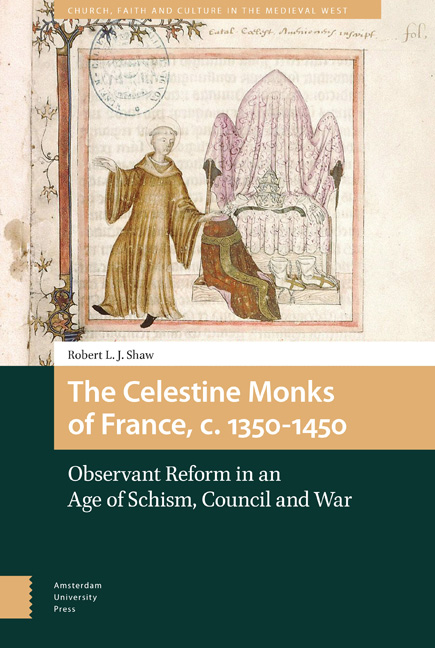Book contents
- Frontmatter
- Contents
- Maps and Figures
- Abbreviations
- Acknowledgements
- Introduction: The Celestine monks of France and the rise of ‘Observant’ reform
- Part I The French Celestines in their world
- Part II The world of the French Celestines
- Epilogue and conclusion
- Appendix 1 Lists and map
- Appendix 2 Reductions of foundation Masses (beyond anniversary Masses) at the Celestine monastery of Paris, 1414 and 1436
- Appendix 3 Reduction of foundation Masses (beyond anniversary masses) at the Celestine monastery of Sens, 1414
- Index
1 - The Vita of Jean Bassand (c.1360–1445)
Published online by Cambridge University Press: 16 February 2021
- Frontmatter
- Contents
- Maps and Figures
- Abbreviations
- Acknowledgements
- Introduction: The Celestine monks of France and the rise of ‘Observant’ reform
- Part I The French Celestines in their world
- Part II The world of the French Celestines
- Epilogue and conclusion
- Appendix 1 Lists and map
- Appendix 2 Reductions of foundation Masses (beyond anniversary Masses) at the Celestine monastery of Paris, 1414 and 1436
- Appendix 3 Reduction of foundation Masses (beyond anniversary masses) at the Celestine monastery of Sens, 1414
- Index
Summary
One of the essential sources for understanding late medieval French Celestine culture is the Vita of Jean Bassand, written in the mid-fifteenth century by an anonymous Celestine monk. Its subject was the most important figure in the French Celestine congregation in the period under study, even eclipsing his mentor, Pierre Pocquet, who had been the first provincial prior of the independent French province in 1380 (see Appendix 1). Jean Bassand was elected provincial prior on five occasions, one more than Pocquet, and unlike Pocquet, he was promoted as a saint in the order. His Vita thus suggests much about the ideal, if not necessarily the real, standard of Celestine life. Beyond that, its author took time to reflect on the meaning of their reform – by way of Bassand's example – in the context of the events, concerns and aspirations of the Christian society that surrounded them.
Provenance and purpose
The text was edited by the Bollandists in the early eighteenth century from four manuscripts, only one of which is now known in French public libraries. The earliest seems to have been a now lost codex found at the Celestine monastery of Paris: the Bollandists used this as their primary witness. The existence of one or possibly two further lost Celestine copies can be deduced from other evidence. Ménard's summary of Bassand's life, based on copies of the Vita in Paris and Amiens, proves that there was a further manuscript at the latter house. The eighteenth-century catalogue of the libraries of the French Celestine congregation only mentions one copy, at Paris, but this codex appears to have been different from the one collated by the Bollandists at around the same time. There is, however, another late medieval witness that the Bollandists were unaware of, a manuscript that originally belonged to the Celestines of Avignon. This presents a very similar text to the edited version, with only minor textual variants, albeit that it excludes the final chapter of post-mortem miracles (c.9) included by the Bollandists. Its mid-fifteenth-century hand allows the text to be firmly dated to the decades immediately following Bassand’s death.
- Type
- Chapter
- Information
- The Celestine Monks of France, c. 1350–1450Observant Reform in an Age of Schism, Council and War, pp. 35 - 64Publisher: Amsterdam University PressPrint publication year: 2018



